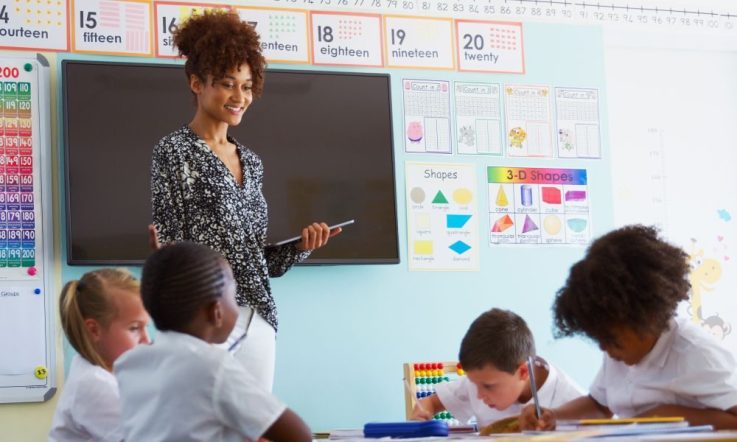Hello, Teacher Deputy Editor Rebecca Vukovic here and I’ll be your host for today, but before we get into the episode, I wanted to give you a quick reminder that if you’re looking for more free content from Teacher head over to the teachermagazine.com website. There are thousands of articles, infographics, videos and podcasts in our archive – they’re all online, they’re all open access, and we publish fresh content throughout the week!
Hello and thanks for listening to this Teacher Staffroom podcast from Teacher magazine, I’m Rebecca Vukovic.
Today we’re talking all things maths – as it’s something we’ve published quite a bit on this month. In this episode, I’m going to run you through the highlights, including an article on the International Mathematical Modeling Challenge where we speak to the teacher advisors of the Australian winners about the benefits for students, and their own practice. As always, we will be posing questions throughout the episode so feel free to pause the audio, gather some colleagues, and chat about how these articles can be used to improve or inform your own practice. Let’s jump in.
Let’s kick it off with the article I mentioned in my intro. For those who don’t know what the International Mathematical Modeling Challenge is, it’s an initiative coordinated by Australian Council for Educational Research here in Australia. Teams of up to 4 students from the same school call on their mathematical knowledge, problem-solving, critical and creative thinking skills, teamwork and resilience to unpack the problem and come up with a solution. They’re also against the clock – teams choose 5 consecutive days during the competition period to work on the problem and complete a report for judging.
Students this year had to formulate a plan on how they would go about bringing together sports teams from around the globe to compete in an international league. There’s wasn’t just the complex fixture schedule to crack – considering time zones and locations while ensuring the matchups were fair – but also economic and environmental sustainability. They also had to plan for possible expansion in the future. So just a few things! To read more about the prize and our interview with the teacher advisors from the Australian winners of the challenge, visit the teachermagazine.com website.
Still on maths, we published another edition of Researching education: Five further readings. In this regular series, we take a look at some further readings available on a particular topic, including open access research papers from various online catalogues, and Teacher archive content you maybe you haven’t come across yet. In this particular edition, we share resources on mathematics education in primary and secondary, including on teaching finance, mathematics anxiety and a lot more.
In other news, Australia’s year 4s achieved the country’s best-ever result in the latest Trends in International Mathematics and Science Study (otherwise known as TIMSS). Alongside the year 4 and 8 assessments, students, teachers and principals at participating schools completed a questionnaire – those findings have been released this month. Check out the article we published about it, as well as an infographic that used TIMSS data to explore instructional clarity in maths and science.
Speaking of infographics, each cycle of the Programme for International Student Assessment (or PISA) includes a student questionnaire. One topic – mathematics anxiety – is characterised by feelings of tension, fear or apprehension when a person is faced with mathematics-related tasks. In an infographic we published this month, there are some useful prompts for teachers when considering their own students. You’ll find that infographic, as well as all the other articles I mention today, in the transcript of this podcast over at the teachermagazine.com website.
After the break, I will be chatting about some more highlights from this month on Teacher, including a new column from Andreas Schleicher on reimagining teacher professional learning.
You’re listening to podcast from Teacher. If you’ve just discovered our podcasts and Teacher magazine, I want to let you know about the additional free content on the teachermagazine.com website. You’ll find more than 3,000 articles, infographics, videos and podcasts in our archive – they’re all online and open access. And it’s where you can sign up to our regular bulletin to get the latest content and trending topics, delivered straight to your inbox. We publish fresh content throughout the week; access everything and sign up to the bulletin at teachermagazine.com.
Okay moving on from maths now, we also published our annual tax tips for teachers article in the run up to the end of financial year. We know that many find the process of filing a tax return confusing and overwhelming, so we put together this guide to help teacher navigate the process. This year, we spoke with the Director of Tax Communications at H&R Block, Mark Chapman, and asked him to share his tips specifically for teachers in 2025. From understanding depreciation, to knowing the best time for lodging your return, we’ve got you covered.
We marked a very special milestone this month – we published the 100th episode of our Research Files podcast series. To celebrate, Jo Earp, Dominque Russell and myself sat down to share our favourite episodes from the series – some that took us all the way back to 2014 when we recorded our first episode in the series. It was such a joy to look back and reflect on some of the incredible interviews we’ve done. We also had a laugh about our recording quality back then and how much podcasting equipment has improved over the past 11 years. After listening to the episode, share with us some of your favourite episodes from the series. Share a story about how you’ve used the podcast in your professional learning or to improve your practice in the classroom. We’d love to hear from you.
Moving on, in a new article from Teacher columnist and OECD Director of Education and Skills Andreas Schleicher, he shares news from an ambitious stakeholder conference he attended in Kyiv, Ukraine.
Here’s something he wrote in that column:
Teacher education that provides real experiences in the classroom, supported with ongoing mentoring and coaching from expert teachers, is essential for all teachers, regardless of their initial pathway to the classroom. It is also about supporting the holistic development of teachers from day one; nurturing teachers’ sense of purpose and their ability to research, collaborate and reflect. These can provide teachers with a “compass” to navigate the complexities and demands of teaching as their careers progress. This is something we see leading systems such as Singapore and Finland – both of whom shared their experiences with Ukraine – place great emphasis on.
And finally, we are so lucky to receive so many submissions and contributions from people around the world who want to write for the magazine. We are really proud to share some of the work that you’re doing in your schools and in your own context to improve learning. In an article for Teacher this month, Rachael Lehr, Associate Principal at Dayton Primary School in Western Australia shares her advice on how to set the tone for a new school term to get the best out of your students and staff. From creating positive relationships, to setting high expectations and revisiting routines, Rachael shares what has worked in her school setting.
Here's a quote from the article:
We open every school year, and each subsequent term, focused on what we believe are the 2 most important elements in successful schools – being warm and being demanding – creating positive relationships and matching these with high expectations and clear routines and structures. We revisit and re-establish the norms of being a student and staff member at Dayton, returning to the foundations that help each child have the best possible start to a new term of learning.
After reading the article in full, consider some of the strategies Rachael Lehr discusses.
Which could you use in your school setting? How will you go about implementing them? What are your priorities for next term? Is this a school-wide approach or something you are working towards in your own practice? What supports do you need to ensure you meet the goals you set for the beginning of term?
That’s all for this episode. Thanks for listening. I’ll leave the links to the full articles and podcast episodes I mentioned today in the transcript of this episode, which you can find under the podcast tab at our website. We’ll be back with a new episode very soon.
The Teacher bulletin is your free, weekly wrap of our latest content – not just the podcasts, but also the articles, the infographics and the videos – straight to your inbox. Click on the sign-up button at our website, teachermagazine.com



